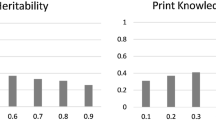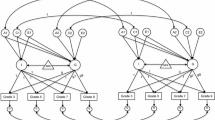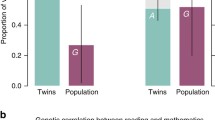Abstract
We examined the genetic and environmental contribution to the stability and instability of reading outcomes in early elementary school using a sample of 283 twin pairs drawn from the Western Reserve Reading Project. Twins were assessed across two measurement occasions. In Wave 1, children were either in kindergarten or first grade. Wave 2 assessments were conducted one year later. Results suggested substantial genetic stability across measurement occasions. Additionally, shared environmental influences also accounted for stability, particularly for variables more closely tied to direct instruction such as phonological awareness, letter knowledge, and word knowledge. There was also evidence for independent genetic and shared environmental effects, suggesting that new sources of variance may emerge as the demands of school change and children begin to acquire early reading skills.
Similar content being viewed by others
References
Bishop D. V. M., (2001). Genetic influences on language impairment and literacy problems in children: Same or different? Journal of Child Psychology and Psychiatry, and Allied Disciplines 42(2):189–198
Byrne B., Delaland C., Fielding-Barnsley R., Quain P., Samuelsson S., Hoien T., Corley R., DeFries J. C., Wadsworth S., Willcutt E., Olson R. K., (2002). Longitudinal twin study of early reading development in three countries: Preliminary results Annals of Dyslexia 52:49–74
Byrne, B., Olson, R. K., Samuelsson, S., Wadsworth, S., Corley, R., Quain, P., DeFries, J. C., & Willcutt, E. (in press). Genetic and environmental influences on early literacy. Journal of Reading Research
Byrne B., Wadsworth S., Corley R., Samuelsson S., Quain P., DeFries J. C., Willcutt E., Olson R. K., (2005). Longitudinal twin study of early literacy development: Preschool and kindergarten phases Scientific Studies of Reading 9(3):219–236
Catts H. W., Hogan T. P., Adlof S. M., (2005). Developmental changes in reading and reading disabilities. In: Catts H. W., Kamhi A. G., (Eds) The connections between language and reading disabilities. Erlbaum, Mahwah, NJ
Chall J. S., (1983). Stages of reading development. McGraw-Hill, New York
Compton D. L., Davis C. J., DeFries J. C., Gayan J., Olson R. K., (2001). Genetic and environmental influences on reading and RAN: An overview of results from the Colorado Twin Study. In: Wolf M., (Eds) Conference proceedings of the Dyslexia research foundation conference in extraordinary brain series: Time, fluency, and developmental dyslexia. York Press, Baltimore, MD, pp 277–303
Dale P. S., Crain-Thorenson C., (1999). Language and literacy in a developmental perspective Journal of Behavioral Education 9:23–33
Davis C. J., Knopik V. S., Olson R. K., Wadsworth S. J., DeFries J. C., (2001). Genetic and environmental influences on rapid naming and reading ability: A twin study Annals of Dyslexia 51:231–247
Fagerheim T., Raeymaekers P., Tonnessen F. E., Pedersen M., Tranebjaerg L., Lubs H. A., (1999). A new gene (DYX3) for dyslexia is located on chromosome 2 Journal of Medical Genetics 36:664–669
Fisher S. E., DeFries J. C., (2002). Developmental dyslexia: Genetic dissection of a complex cognitive trait Nature Reviews Neuroscience 3:767–780
Fisher S. E., Francks C., Marlow A. J., MacPhie I. L., Newbury D. F., Cardon L. R., Ishikawa-Brush Y., Richardson A. J., Talcott J. B., Gayán J., Olson R. K., Pennington B. F., Smith S. D., DeFries J. C., Stein J. F., Monaco A. P., (2002). Independent genome-wide scans identify a chromosome 18 quantitative-trait locus influencing dyslexia Nature Genetics 30:86–91
Freeman B., Smith N., Curtis C., Huckett L., Mill J., Craig I. W., (2003). DNA from buccal swabs recruited by mail: Evaluation of storage effects on long-term stability and suitability for multiplex polymerase chain reaction genotyping Behavior Genetics 33(1):67–72
Gayan J., Olson R. K., (2001). Genetic and environmental influences on orthographic and phonological skills in children with reading disabilities Developmental Neuropsychology 20(2):487–511
Gayan J., Olson R. K., (2003). Genetic and environmental influences on individual differences in printed word recognition Journal of Experimental Child Psychology 84:97–123
Goodglass H., Kaplan E., (2001). The boston naming test. (2 Edition). Lippincott Williams & Wilkins, New York
Gough P. B., Tunmer W. E., (1986). Decoding, reading, and reading disability Remedial and Special Education 7(1):6–10
Grigorenko E. L., (2005). A conservative meta-analysis of linkage and linkage-association studies of developmental dyslexia Scientific Studies of Reading 9(3):285–316
Harlaar, N., Dale, P. S., & Plomin, R. (2005). Correspondence between telephone testing and teacher assessments of reading in 7-year-olds: II. Strong genetic overlap in a sample of 2660 twin pairs. Reading & Writing: An Interdisciplinary Journal, 18(5), 401–423
Harlaar, N., Spinath, F. M., Dale, P. S., & Plomin, R. (2005). Genetic influences on word recognition abilities and disabilities: A study of 7-year old twins. Journal of Child Psychology and Psychiatry, 46(4), 373–384
Hohnen B., Stevenson J., (1999). The structure of genetic influences on general cognitive, language, phonological, and reading abilities Developmental Psychology 35:590–603
Hoover W. A., Gough P. B., (1990). The simple view of reading Reading and Writing 2(2):127–160
Knopik V. S., Alarcón M., DeFries J. C., (1998). Common and specific gender influences on individual differences in reading performance: A twin study Personality and Individual Differences 25(2):269–277
McCardle P., Scarborough H. S., Catts H. W., (2001). Predicting, explaining, and preventing children’s reading difficulties Learning Disabilities Research and Practice 16(4):230–239
Molfese D., Molfese V., Key A. F., Kelly S., (2003). Influence of environment on speech-sound discrimination: Findings from a longitudinal study Developmental Neuropsychology 24:541–558
Neale, M. C., Boker, S. M., Xie, G., & Maes, H. H., (2002). Mx: Statistical modeling (6th ed.). VCU Box 900125, Richmond, VA 23298: Department of Psychiatry
Neale M. C., Cardon L. R., (1992). Methodology for genetic studies of twins and families. Kluwer Academic Publishers, Dordrecht, The Netherlands
Nopola-Hemmi J., Myllyluoma B., Haltia T., Taipale M., Ollikainen V., Ahonen T. et al. (2001). A dominant gene for developmental dyslexia on chromosome 3 Journal of Medical Genetics 38:658–664
Olson R. K., Forsberg H., Wise B., (1994). Genes, environment, and the development of orthographic skills. In: Berninger V. W., (Eds) The varieties of orthographic knowledge I: Theoretical and developmental issues. Kluwer Academic Publishers, Dordrecht, The Netherlands, pp 27–71
Olson R. K., Gillis J. J., Rack J. P., DeFries J. C., Fulker D. W., (1991). Confirmatory factor analysis of word recognition and process measures in the Colorado Reading Project Reading and Writing 3:235–248
Pennington B. F., Smith S. D., (1983). Genetic influences on learning disabilities and speech and language disorders Child Development 54:369–387
Petrill S. A., (2005). Behavioral genetics and intelligence. In: Wilhelm O., Engle R. W., (Eds) Handbook of understanding and measuring intelligence. Sage, Thousand Oaks, CA, pp 165–176
Petrill S. A., Deater-Deckard K., Schatschneider C., Davis C., (2005). Measured environmental influences on early reading: Evidence from an adoption study Scientific Studies of Reading 9(3):237–260
Petrill, S. A., Deater-Deckard, K., Thompson, L. A., DeThorne L., & Schatschneider, C. (2006). Reading skills in early readers: Genetic and shared environmental influences. Journal of Learning Disabilities, 39(1), 48–55
Petrill. S. A., Deater-Deckard, K., Thompson, L. A., DeThorne, L. S., & Schatschneider, C. (2006). Genetic and environmental effects of serial naming and phonological awareness on reading outcomes. Journal of Educational Psychology, 98(1), 112–121
Petrill, S. A., Deater-Deckard, K., Thompson, L. A., DeThorne L., & Schatschneider, C. (in preparation). The relationship between decoding and comprehension in early reading: Genetic and environmental influences
Robertson C., Salter W., (1997). The phonological awareness test. LinguiSystems, Inc., East Moline, IL
Scarborough H. S., (1998). Early identification of children at risk for reading disabilities: Phonological awareness and some other promising predictors. In: Shapiro, B. K., Accardo, P. J., Capute, A. J., (Eds) Specific reading disability: A view of the spectrum. York Press, Timonium, MD, pp. 75–119
Scarr S., McCartney K., (1983). How people make their own environments: A theory of genotype-environment effects Child Development 54:424–435
Schatschneider C., Francis D. J., Foorman B. F., Fletcher J. M., Mehta P., (1999). The dimensionality of phonological awareness: An application of item response theory Journal of Educational Psychology 91:467–478
Seidman, S., Petrill, S. A., Deater-Deckard, K., Thompson, L. A., Schatschneider, C., & DeThorne, L. S. (2005). Assessing the role of home and school environments in early literacy. Manuscript submitted for publication
Stevenson J., Graham P., Fredman G., McLoughlin V., (1987). A twin study of genetic influences on reading and spelling ability and disability Journal of Child Psychology and Psychiatry 28(2):229–247
Trouton A., Spinath F. M., Plomin R., (2002). Twins Early Development Study (TEDS): A multivariate, longitudinal genetic investigation of language, cognition and behaviour problems in childhood Twin Research 5:444–448
Wadsworth S. J., Corley R. P., Hewitt J. K., Plomin R., DeFries J. C., (2002). Parent-offspring resemblance for reading performance at 7, 12 and 16 years of age in the Colorado adoption project Journal of Child Psychology and Psychiatry and Allied Disciplines 43(6):769–774
Wagner, R. K., Torgesen J. K., & Rashotte, C. A. (1999). Comprehensive test of phonological processing. Austin, TX: PRO-ED
Woodcock R. W., (1987). Woodcock reading mastery tests. American Guidance Service, Circle Pines, MN
Acknowledgement
The Western Reserve Reading Project is supported by NICHD grant HD38075 and NICHD/OSERS grant HD46167.
Author information
Authors and Affiliations
Corresponding author
Rights and permissions
About this article
Cite this article
Petrill, S.A., Deater-Deckard, K., Thompson, L. et al. Longitudinal Genetic Analysis of Early Reading: The Western Reserve Reading Project. Read Writ 20, 127–146 (2007). https://doi.org/10.1007/s11145-006-9021-2
Accepted:
Published:
Issue Date:
DOI: https://doi.org/10.1007/s11145-006-9021-2




